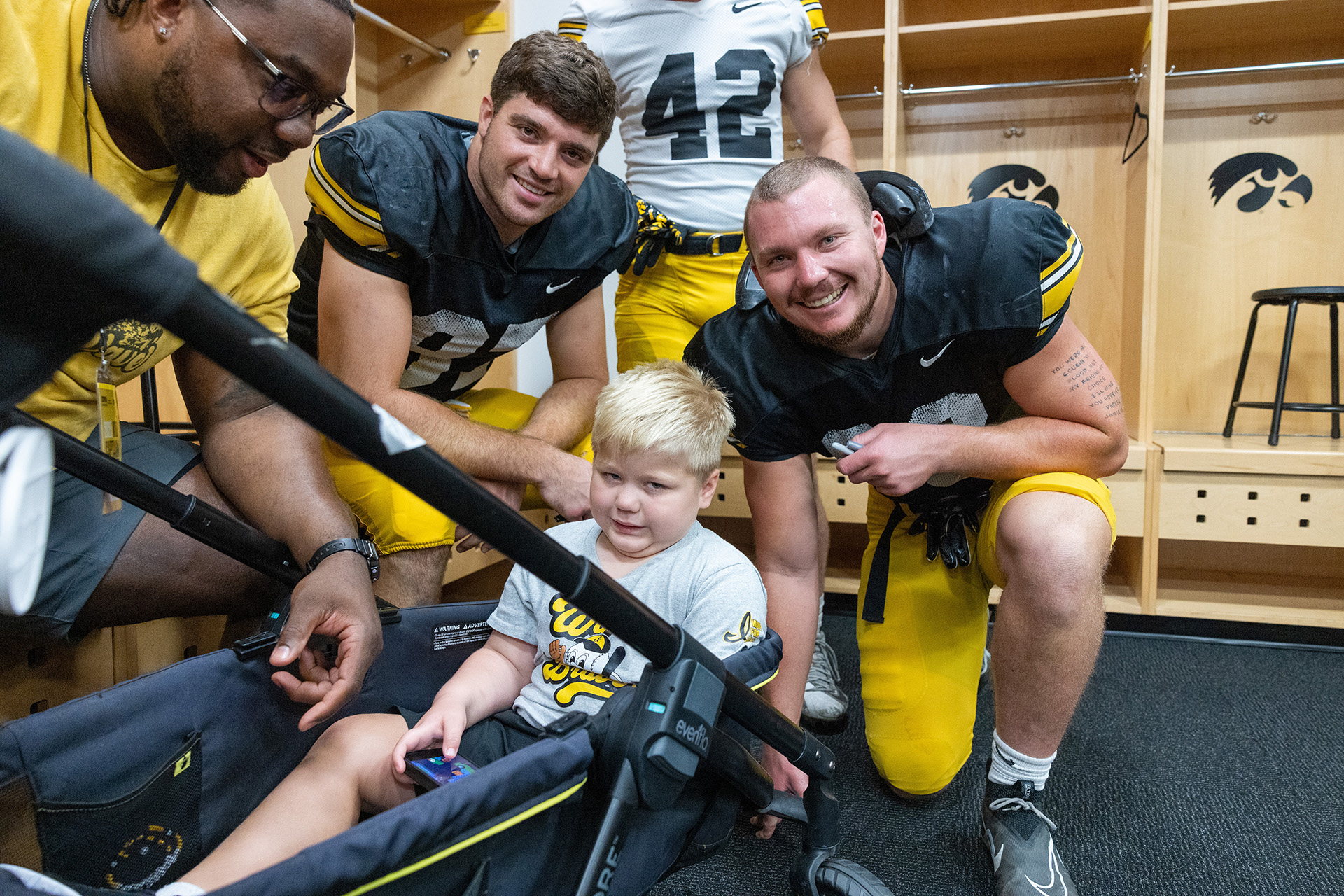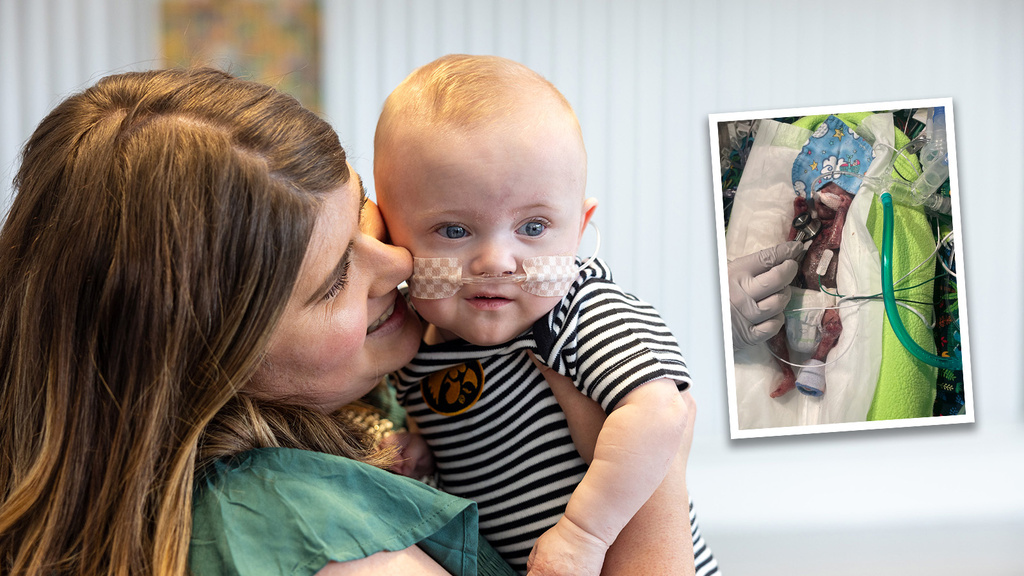When James Hall was diagnosed with a rare, cancer-like disease, his family took comfort in knowing that the Dyersville, Iowa, boy would receive top-notch care at UI Health Care Stead Family Children’s Hospital.
Story and videography: UI Health Care Marketing and Communications
Photography: Liz Martin
Published: Sept. 1, 2025
What seemed like normal baby issues turned out to be something more serious for James Hall, the second Kid Captain of the 2025 Iowa football season.
When James was around 4 months old, his parents, Ashley and Nate Hall, say he appeared to be a happy, relatively healthy baby with a few minor issues normal for any baby.
But when he turned 10 months old, chronic ear infections led the family of the Dyersville boy to a local ear, nose, and throat specialist, also known as an otolaryngologist. Suspecting James might have a cyst, the doctor ordered a CT scan and the family hoped for answers.
Unfortunately, the answer was one that no parent is ever prepared for. The scan detected a mass in the left temporal lobe of James’ brain and he was immediately referred to University of Iowa Health Care Stead Family Children’s Hospital.
“We were very much caught off-guard,” Ashley Hall says.
The horrible surprises continued when further tests revealed a second tumor at the back of James’ skull. Hall recalls how the news played out as they waited for one of their first appointments with UI Health Care.
“While we were waiting in the room for otolaryngology, we were told we would be skipping that appointment, and instead we would be sent to Level 11, the children’s oncology floor,” Hall says. “From that day, Level 11 became our second home, and the staff became our second family.”
The No. 1 children's hospital in Iowa
University of Iowa Health Care Stead Family Children’s Hospital is Iowa’s only nationally ranked children’s hospital, offering all pediatric subspecialties and caring for kids from all 99 counties in Iowa. We provide world-class pediatric care that families trust — and kids deserve.
The ‘best worst-case scenario’
By this time, James had just turned a year old, and their family included two other children at home and a new baby on the way. James underwent a series of tests, including magnetic resonance imaging (MRI), X-rays, a biopsy, surgery to place a port, and chemotherapy.
“The days were a whirlwind, but we went home knowing we were in the right place,” Hall says.
Initially, they were told James might have one of three potential medical conditions, one of which was called Langerhans cell histiocytosis (LCH). The cancer-like disorder happens when immature immune system cells, called Langerhans cells, build up in a child’s body.
“Of the three, that was the best worst-case scenario,” Hall says. The report came back positive for Langerhans cell histiocytosis.
The rare disorder, occurring in just one to two out of every 1 million newborns each year, closely resembles leukemia, causing tissue damage or lesions.
James underwent chemotherapy and a high-dose steroid treatment. He was also found to have a genetic mutation, and while it allows for more targeted therapy options, it also increases the odds of a return of the cancer-like condition after treatment.
“We have committed to helping families through pediatric cancer, even while we are going through it, as it gives James’ diagnosis a purpose.”
Another tumor found
Because James’ disease is similar to cancer, he’s seen by oncology specialists like David Dickens, MD. He says James’ LCH disease is caused by a mutation in the cells of the immune system.
“With that mutation, certain cells of the immune system behave like cancer in that the cells grow out of control” Dickens says. “Chemotherapy is a broad term for medications that stops cells from growing. It can be used to treat diseases other than cancer, such as rheumatologic diseases.”
He finished chemotherapy treatment in May 2022, and tests showed no evidence of the tumors. In December of that year, however, James would experience another twist in the roller coaster of his health care journey.
“It could be late at night or it could be the middle of the afternoon, and he would just wake up and immediately throw up,” Hall says, adding that James would vomit with no other symptoms or apparent cause.
When the vomiting persisted, his care team ordered further tests, including a brain MRI.
On May 8, 2023, one year and two days after he rang the bell to signify the end of his chemotherapy, the family was told that another brain tumor had been detected.
“That was the worst day,” Hall says. “That was really hard to hear.”
A new phase of treatment
Because of its location in his brain stem, they were advised to not biopsy the tumor, due to the risk of complications, including death.
“His case is so rare that his care team has stated they have not found another case like his,” Hall says.
James went back on steroids to help with the swelling in his brain and in July 2023, resumed chemotherapy treatment. Those treatments were halted, however, when they didn’t improve his condition. The decision was made to treat his brain tumor with radiation therapy which stabilized the brain tumor in his pons, leading to the potential diagnosis of a low-grade glioma. Unfortunately, in January 2025, his LCH returned in his pituitary gland and thymus, which is being retreated with chemotherapy.

James Hall, seen here with Iowa tight ends Addison Ostrenga (left) and Hayden Large during Kids Day at Kinnick, enjoys playing sports, including t-ball, swimming, and basketball.
Why we wave
Now 5 years old and in kindergarten, James enjoys playing sports, including t-ball, swimming and basketball, along with video games, which are the favorite part of his hospital stays.
“He calls it ‘Dr. Dickens Hospital,’” Hall says, referring to the bond between James and his care team.
In 2021, when James was first diagnosed, Dickens brought hospital staff to the Field of Dreams in Dyersville for a team-building event. Ashley invited local families to meet with the staff and raised money for the hospital by selling chances for prizes that had been donated.
That led to annual events at the Field of Dreams and the founding of the Why We Wave Foundation, which saw an increasing number of guests at the event and funds donated each year.
Last year, Ashley wanted families undergoing oncology care at Stead Family Children’s Hospital to experience a football game, and 63 families registered for the opportunity within one week. Other patient families pitched in to allow cancer patients and their relatives a chance to experience the Hawkeye Wave from inside Kinnick Stadium.
More fundraising will allow the Field of Dreams event to continue this year, along with cancer patients and their families attending another football game at Kinnick.
“It has now been four years since our son was diagnosed. There are good and bad days in childhood cancer. People show up and care,” Hall says, noting the foundation has provided financial help for both basic necessities like gas or groceries as well as respite experiences for families like tickets to a Hawkeye basketball game “We have committed to helping families through pediatric cancer, even while we are going through it, as it gives James' diagnosis a purpose.”
“In a year of so many unknowns for our family,” she adds, “the one thing we did know was we would receive the care we needed at UI Stead Family Children’s Hospital.”
Great stories happen at Iowa

Meet Kid Captain Nolan Stevenson

Iowa boy born at 21 weeks is now world's most premature baby

